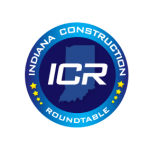By The Indiana Construction Roundtable Foundation
Leaders from throughout Indiana’s construction industry have united to focus on diversity in the industry’s workforce efforts through the Indiana Construction Roundtable Foundation (ICRF).
Originally formed out of the Indiana Construction Roundtable (ICR), which is a commercial construction association, the ICRF has now formally brought together union and non-union companies who work in commercial, residential and road construction markets. Diversity is a central focus of this collaborative effort.
Rick Wajda, CEO of the Indiana Builders Association, when asked about this effort, states, “to best serve our communities, all segments of the construction industry must come together for a cooperative effort. By putting aside our differences and shifting the focus to helping people in need, we will raise the tide to meet the needs of all construction employers, regardless of a business’ specialization.”
“Construction can provide not just a job, but a good living — and an even better life — for Hoosiers across all demographics,” says Richard Hedgecock, president of Indiana Constructors, Inc.
According to Hoosiers by the Numbers, in the fourth quarter of 2017 there were more than 8,000 job openings posted in construction, major maintenance and related fields in the greater Indianapolis region. These openings paid an average of $23.40 per hour, plus paid benefits. “This is a small portion of the total number of open opportunities across the state of Indiana in construction, and more open up every day,” says Mike Thibideau, executive director of the Indiana Construction Roundtable. “In every survey conducted of our members and members of partnering organizations, workforce development is nearly unanimously the top concern of the construction business community.” According to Construction Labor Market Analyzer (CLMA), the average construction worker in Indiana is 49 years old.
Leaders from throughout the state’s industry cite a lack of diversity as a top concern for the industry’s future. “Historically, the construction industry has largely relied on referrals from their most skilled workers to identify new hires,” says Chris Price, president of the ICRF. “If John is a good electrician, and John recommends Zach, then Zach will probably be a good worker too. Until now, this strategy has been working. Industry has been able to meet the need of construction consumers, but this strategy has perpetuated the lack of diversity within industry.”
Price, through his work with the ICRF, originally brought together all of the above-named construction segments to focus on student outreach through Build Your Future Indiana. He sees this youth outreach as an essential component to addressing the future needs of industry, but sees more change as being necessary to make change today and help individuals throughout the state find opportunity in construction.
“The construction industry is trending backwards on diversity,” says Price, “according to the Bureau of Labor Statistics (BLS), in 1983, when the first federal legislation was enacted for minority business enterprises (MBE), African-Americans accounted for 6.6 percent of the construction workforce. As an industry, we are currently comprised of 2.6 percent women and 5.8 percent African-Americans. While diversity spending is helping to develop a network of qualified entrepreneurs, additional actions must be taken to reverse this downward trend in our workforce.”
Starting in May, the ICRF will begin publicly marketing plans for a training model that will add focus to the challenge of diversity. This is a one-month program, built with the intention of providing individuals with the skills and confidence to begin a career in construction. Built around national industry accredited courses and credentials, participants in the program will have exposure to soft skills training paired with education on hand tools, power tools, construction mathematics, blueprint reading, basic rigging and construction safety. The training will be offered at no cost to the student, and at the end of the program graduates will be connected directly to companies.
Price, when speaking about the program, states, “with minimal outreach to nine regional construction firms, the foundation has already identified 844 entry-level jobs that need to be filled, at an average starting wage of $20.30 per hour, plus benefits. Never has there been a better time to bring about change. We have an opportunity and obligation to change the course of our industry, for the good of people in our communities.”
You can also catch this article in our latest edition of Insights in Construction.
8909 Purdue Road, Suite 130
Indianapolis, Indiana 46268
317.805.1037
Chris Price, President
cprice@indianaconstruction.org

